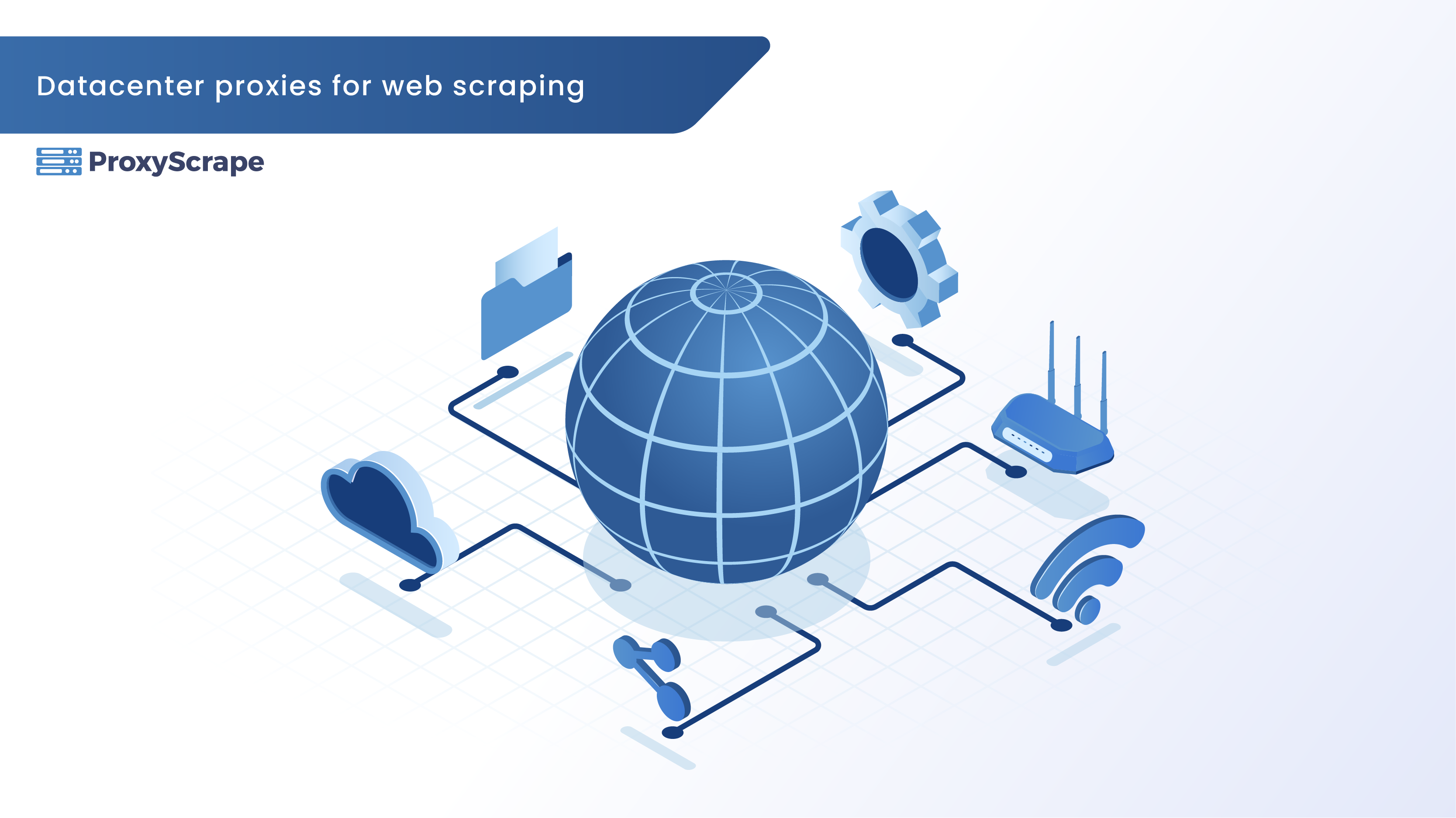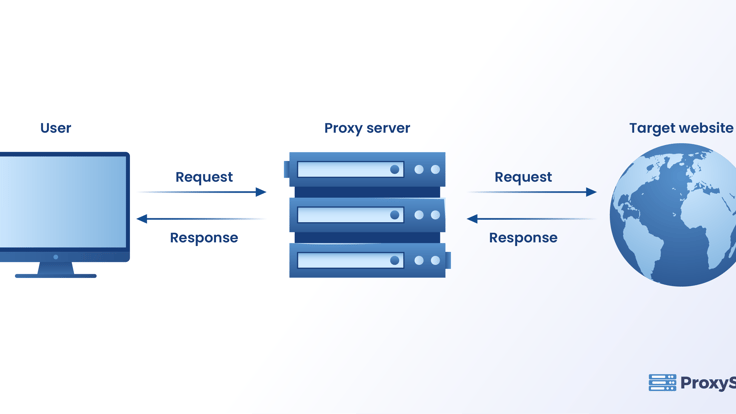Datacenter Proxies for Web Scraping – The Complete Guide

Businesses need data for price monitoring, competitor analysis, sentiment analysis, and price aggregation from different sources. Scraping a large amount of data is time-consuming and must be anonymous. Proxies help in web scraping as they hide the user’s identity, are automated and are widely available. You must choose proxies based on the purpose and need
Businesses need data for price monitoring, competitor analysis, sentiment analysis, and price aggregation from different sources. Scraping a large amount of data is time-consuming and must be anonymous. Proxies help in web scraping as they hide the user’s identity, are automated and are widely available.
You must choose proxies based on the purpose and need of the web scraping project. There are datacenter proxies, dedicated proxies, and residential proxies that are either free, shared, or exclusive.
You may use datacenter proxies for web scraping, accessing geo-restricted sites, and SEO monitoring. A datacenter or cloud provider owns and manages these proxies that protect the identity of the user by masking the IP address while accessing the web.
Users use proxies for scraping vast data from websites without the website blocking them. Datacenter proxies are not affiliated with an Internet Service Provider (ISP). Instead, a separate corporation that offers complete anonymity and private IP address authentication offers them. The benefits of proxies include protecting the user’s identity while allowing smooth web scraping.
What is a Datacenter Proxy?
The datacenter proxy masks or hides the IP address of the user by forwarding a scraping request from the user to the target website through a proxy server. Datacenter proxies are not registered with an Internet Service Provider(ISP) but are offered by datacenters that have a pool of proxies.
These proxies provide anonymity so the target website doesn’t block them. Datacenter proxies provide IP address authentication where only authenticated users may access the proxies during a specific period.
Datacenter proxies change the location virtually for the user to access content from any country that restricts them if they are from a different geographical location.
Datacenter proxies are remote servers that you can connect to if you need to mask your IP address for any reason. These proxies are shared, so other users will use the same proxy simultaneously which can lead to complications.
Datacenter proxies offer hundreds of subnets to ensure that the website won’t block or cloak you. A user gets a huge pool of proxy IPs from each subnet to scrape the website without it blocking them.
How does a Datacenter Proxy work?
What makes datacenter proxies unique is that they are not attached to any ISP provider and their IP addresses are hard to find. The proxies are from data centers or cloud providers like AWS and Google Cloud.
Since they are private proxies, they ensure little to no IP blacklisting. Websites use blacklists to block the IP addresses of an individual or a subnet to filter out illegitimate or malicious IP addresses from accessing their websites. Websites that maintain these lists are with firewalls, intrusion prevention systems (IPS), and other traffic filtering tools that block any requests that come from the listed IP addresses.

These proxies work by hiding your real IP address so that the destination website can’t identify the real IP address, which enables the user to access the website anonymously. Datacenter proxies help access geo-restricted content because some websites are in a country whose servers hide certain information for users from a different location. Datacenter proxies access such content and help to get around the server block.
Web scraping using a datacenter proxy
The request goes to a proxy server when you use a datacenter proxy to scrape data from a website. The proxy server processes the request using a proxy from its pool and forwards the request to the target website.
The target website verifies the request and sends back the response via the proxy server and the proxy server hands it back to the user. This makes your IP hidden from the target website as they cannot trace it back to the datacenter or other providers who offered the proxies.
Types of Datacenter Proxies for Web Scraping
The datacenter proxies are classified into different types based on their usage and accessibility. Web scraping proxies require anonymity and must access restricted content based on location.
Private Datacenter Proxies
Private datacenter proxies are dedicated proxies as the IP address can scrape a specific domain or for a duration. They are fast and great for use for projects that require high-speed proxies like web scraping, and SEO.
Public Datacenter Proxies
It is a free proxy for the basic requirements. In scraping business or in SEO, hosts restrict certain sites based on the location. In the SEO aspect, it is important to access competitors’ websites or other websites to gather information related to sales and marketing. However, the home country’s government restricts websites that are not accessible as the country might restrict IP addresses from a different country due to their cyber security laws.
Public Datacenter proxies help you hide your IP address and process the request through the location-specific proxy. These proxies don’t guarantee speed and security and are not recommended for complex tasks.
Shared Datacenter Proxies
Three people at maximum share this proxy simultaneously but are faster than public datacenter proxies. Since they are shared, a datacenter can block them as a malicious activity might be identified with the IP address of another user.
Advantages of Datacenter Proxies
Datacenter proxies are the better option for various reasons apart from providing anonymity. They are
Speed
Datacenters designed these servers to handle huge users that offer a high bandwidth. They are hosted on fast data center machines, so the speed is higher than residential or dedicated proxies.
Price
They are cheaper as datacenters split the price among their users as they are created in enormous numbers. An extensive number of users share these proxies, thereby distributing the cost among them.
Scalable
They are scalable as the users access all the proxies in the pool concurrently because datacenter proxies are available in huge numbers and accessible all the time and have a faster response time.
IP Rotation
Datacenter proxies run on advanced rotation algorithms and it assigns a new IP address for every new connection request.
Disadvantages of Datacenter Proxies
Datacenter proxies don’t belong to a genuine IP user and do not offer high security and reliability.
Risk of getting banned
Since there are other users who can use the same proxy, there is a higher chance of a website banning them. The destination servers might suspect the same IP is being reused and either ban you temporarily or permanently. There is a risk of the entire subnet also getting blocked as the subnet address is also shared.
Unsecured
Websites that run anti-scraper software or projects can easily block datacenter proxies as they can identify the proxies coming from a datacenter. Residential proxies are secured so they appear as genuine proxies from a local ISP.
Datacenter Proxy vs Residential Proxy
The way service providers acquire IP addresses is different in the datacenter and residential proxies. The ISP offers a genuine IP address for the residential proxy whereas datacenter proxies are overseen by datacenters or other providers. A user can decide which proxy to choose for their project based on the following differences.
| Datacenter Proxy | Residential Proxy |
| Datacenter IPs are from a data center or from a cloud service provider. | Residential Proxy IPs are provided by an ISP. |
| Datacenter proxies are created in bulk and offered as a subnet. The datacenter servers forward the requests from the actual user through a virtual IP. | Since residential proxies are created by a real ISP, the IP addresses are real and legitimate. |
| They are easily detected and blacklisted if datacenter proxies are purchased from an untrusted provider. Nevertheless, a private datacenter proxy offers anonymity to some extent. | A residential proxy is hard to detect as it rotates the IP addresses.The service provider assigns fresh IP addresses from its vast pool of IP addresses at regular intervals. |
| Datacenter proxies are cheaper as they are created in bulk and shared among users. The cost is split amongst them. | They are difficult to acquire and maintain, therefore they are costly. |
| Datacenter proxy providing servers are designed to be fast, therefore they have high performance. | Residential proxies are not as fast as datacenter proxies. |
Final Thoughts
Does your business need a lot of fast proxies at a reasonable price? Does your scraping generate traffic and do you wish to stay anonymous while scraping? If so, then, the obvious choice is a datacenter proxy.
Web scraping is a complex task and requires enormous proxies to scrape websites without getting blocked. A private or a static datacenter proxy ensures anonymity and better results. If you find it hard to decide which proxies to use for your business, check out at ProxyScrape offering a variety of proxies for all your needs.
ProxyScrape has a pool of fast, static datacenter proxies from which the users can get proxies at affordable rates. It ensures unlimited bandwidth and unlimited concurrent connections and supports HTTP/S and SOCKS4/5 datacenter proxies. It also offers up to 3 whitelisted IPs included in the index of the approved proxies.